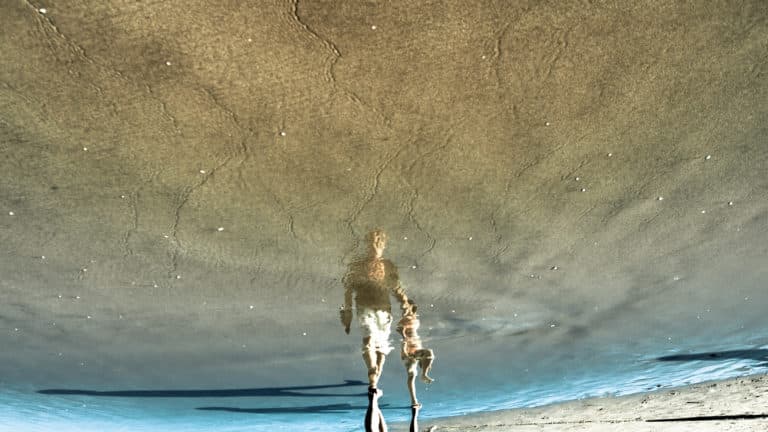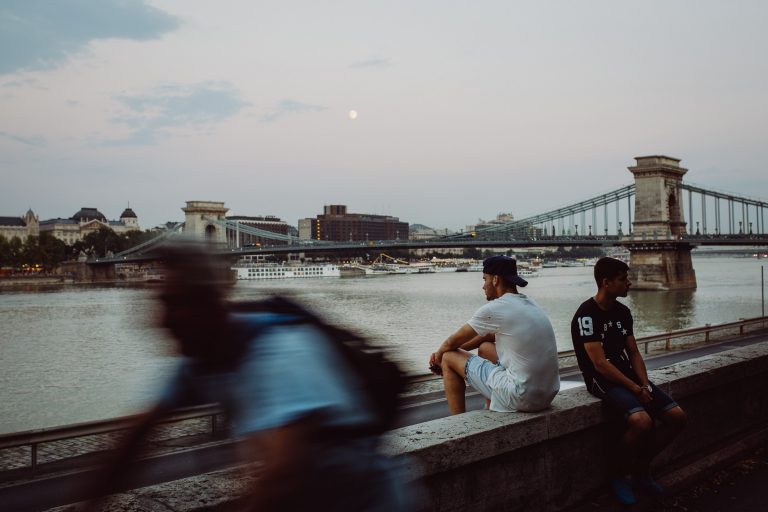
Image by Hernán Piñera/Flickr, Attribution-ShareAlike.
Praying to a Linebacker Ghost
When we were kids, my parents took my brother and me to a Unitarian church for a stint, but pretty quickly decided it wasn’t worth the Sunday morning negotiations that it took to get our little butts in the church pews. Sometimes I would go to services with my grandmother, a devout Episcopalian, but I had no idea what was going on. It felt like I’d entered an elaborate play where everyone knew the rules except for me. It was kind of thrilling, but only because I hardly ever went.
In the absence of any formal or consistent religious training, however, I got intrigued by the idea of praying. It intuitively struck me as a comfort to send thoughts — both gracious and frightened — out into the night sky and have someone powerful listen to them.
I was a fearful kid. When my parents went on walks in the park, I made them tell me when they expected to be home. If they were even a minute late, I would start to panic. I was also sporadically convinced I was going to be kidnapped straight from my little canopy bed on Tejon Sreet. I would open my mouth to scream, I imagined, and nothing would come out. It was the early ‘80s, when little girls’ pictures were emblazoned on the milk cartons stationed next to our breakfast cereal. Fear was in the air.
Praying, I decided, might be a form of insurance against truly terrible things happening to you. Problem was, I knew nothing of God, to whom I understood most people prayed. He was no different from Ronald Reagan to me — an important guy whom all the adults talked about, but I’d never laid eyes on. I wasn’t about to trust my family’s safety to someone I’d never actually met.
On the other hand, it seemed like a prerequisite that the receiver of prayers be someone mystical. I very well couldn’t pray to my favorite teacher, Mrs. Fanning, and expect her to keep my family safe. She had 25 other kids in her classroom whom she had to keep track of.
So where did this strange little-girl logic land? I decided that I would pray to my dead grandfather. I’d never met him. He died suddenly while my mom was pregnant with me. But I knew a few things. He was big, a University of Nebraska football player so strong that he sometimes broke the necks off of beer bottles when he mistakenly thought a cap was a twist-off. He was a traveling salesman who once had my grandmother sew a dress shirt with Velcro along the arms so he could exclaim, “I’ll give you the shirt off my back!” as he ripped it off in front of potential clients. He was the one person my mom felt truly understood her.
That was enough for me. He seemed like the kind of guy who wouldn’t mind listening to the untrained prayers of a frightened little girl and could easily keep us all safe. I didn’t know exactly where he was, but I assumed he somehow knew how and when to tune in to my monologues, whispered toward the ceiling covered in glow-in-the-dark stickers.
To my own surprise, about 30 years later, I remember the exact words that I began with each night:
“Dear Grandpa Cork, thank you for Mom, Dad, Chris, Licorice (my cat), and all my friends. Please keep us happy, healthy, safe, and sound.”
I would go on to list things I was particularly grateful for that day and then detail any special requests. These I don’t remember. They have faded into the ether of longing that is my birthright, that is everyone’s birthright. We want to keep our kin safe. We love so hard that most of us must believe that someone more powerful than ourselves is protecting our beloved. I’m not sure we’re wrong. I’m not sure we’re right. I just know that the human condition is, in large part, about loving and fearing loss, no matter how inevitable the loss and how ineffectual the fear. It makes us mutter in the darkness, hoping our desperate words travel far to omnipotent ears.
My grandfather wasn’t omnipotent. After all, he died way too soon. But he was strong. And he was Irish. I was reminded of my early faith in him when I read that Halloween’s origins actually date back to the ancient Celtic festival of Samhain. The Celts, who lived 2,000 years ago in the area that is now Ireland, believed that on the night of October 31, the boundary between the worlds of the living and the dead became blurred. So tomorrow, after I’ve taken my two-year-old, stuffed into a chicken costume, to knock on doors and gather candy I will no doubt eat myself, I’m going to open a cold beer and have a little talk with Grandpa Cork.
It’s been a while since I addressed him directly, but I have a hunch he’s been listening anyway. My daughter was born on his birthday. She’s got his mischievous smirk. There’s still — after all this time — so much to love and so much to lose.


Share your reflection